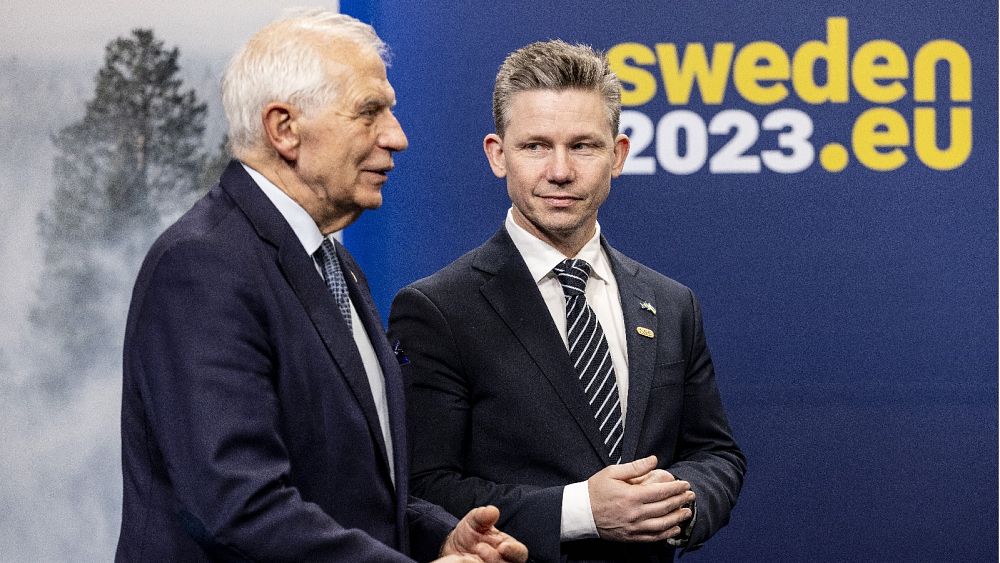
European Union defence ministers are on Wednesday discussing plans for weapons joint procurement to boost ammunition deliveries to Ukraine and replenish depleted domestic stockpiles.
Ministers will discuss a plan put forward by the bloc’s top diplomat, Josep Borrell, based on three pillars: ramp up deliveries from remaining stockpiles, boost production of ammunition across the 27 member states through joint procurement, and increase the bloc’s defence industry’s capacity for the longer-term.
Ukrainian Defence Minister Oleksiy Reznikov, who joined the gathering in Stockholm, Sweden, told reporters ahead of the meeting that his country needs «one million ammunitions for 155-millimetre artillery systems» as well as more infantry fighting vehicles including tanks.
«Normally it would be nice to have 90,000 or 100,000 (ammunition rounds) per month to be ready to deter enemies and be ready to go with the counteroffensive campaign,» he added.
But although EU countries largely agree on providing more military supplies to Ukraine, one of the main issues likely to be splitting them is financing.
Estonia estimates that €4 billion are needed to ensure deliveries of the one million ammunition Ukraine needs.
«For us as ministers here, what we need and what I hope to have today is a political consensus or political agreement that, yes, we will do one million rounds as soon as possible,» Estonian Defence minister Hanno PevKur told reporters.
«This is why we all know that we need fresh money. And this is, you know, one of the most important things also to get today that, you know, we cannot only hope that we have something in (the) European Peace facility or in some other instruments. We need fresh money and we need it quickly,» he also said.
‘Money doesn’t come from the sky’
Borrell, meanwhile, said the EU is ready to put €1 billion from the European Peace Facility — an off-budget fund member states can tap into to get part of what they have provided Ukraine reimbursed — on the table to get countries to transfer existing ammunition to Ukraine.
«Money doesn’t come from the sky. That’s not because one member state is claiming that we need to have more money, that the money will appear by miracle,» he said.
«Let’s be realistic and pragmatic. [Let’s] not discuss about the infinity, [but] discuss about the things that can be adopted today. One thing is good wishes, another thing is practical realities. The European Peace Facility is ready to mobilise all [of] its resources.
He added however that «to ramp up the capacity of the European industry, this is something for which the [European] Commission has to provide financing» as the European Defence Agency (EDA) «has no financial resources for that».
«If I ask Member States to provide Ukraine with their stockpiles, they have to have the insurance that these stockpiles will be renewed: “I give, expecting that I will get more in the future.”
«Ukraine needs it now. Member States – happily for them – are not at war. They can wait. But the three things need to go together: more industrial capacity means more production; more production means more contracts; more contracts [means] more stockpiles and more [deliveries] to Ukraine,» he said.
The EU’s internal market commissioner, Thierry Breton, said the Commission «will be ready to put also some money for our budget to speed up the ramping up of our defence industry» but he also urged the finance sector to support the defence industry.
Breton is also in favour of allowing the European Investment Bank (EIB) to support the sector too.
Currently, the EIB is prohibited from investing in core defence activities or assets which include ammunition and other weapons.
Reznikov said he understands that any decision will have to follow «procedure and bureaucratic rules» but stressed however that «during wartime, time is vital.»
«As (NATO Secretary General) Jens Stoltenberg told us in Brussels (at the) last meeting of Rammstein, time saves lives. That’s why we need to move forward as soon as possible,» he said.
Ukrainian and Russian forces are currently engaged in heavy fighting in Bakhmut, a strategically important city in the east. Fighting is expected to intensify as the winter makes make for spring.
Nord Stream sabotage
Another topic likely to be discussed is the release of new intelligence that suggests the undersea sabotage of the Nord Stream pipelines was carried out by a pro-Ukrainian saboteur group.
The September 26, 2022 bombings took place in international waters in the Baltic Sea, near the Danish island of Bornholm. The explosions damaged the pipelines connecting Russia and Germany releasing tonnes of Russian gas into the Baltic.
The sabotage came after Russia had already sharply reduced gas deliveries to Europe, initially citing technical issues before demanding the lifting of EU sanctions.
Borrell refused to comment on the topic before the meeting on Wednesday, telling reporters he does not have «clear evidence and information.»
Reznikov called it «a little bit strange story» and said «it’s nothing with us.»
«I think that (the) investigation of official authorities will describe every detail. It’s like a compliment for our special forces but this is not our activity,» he added.
